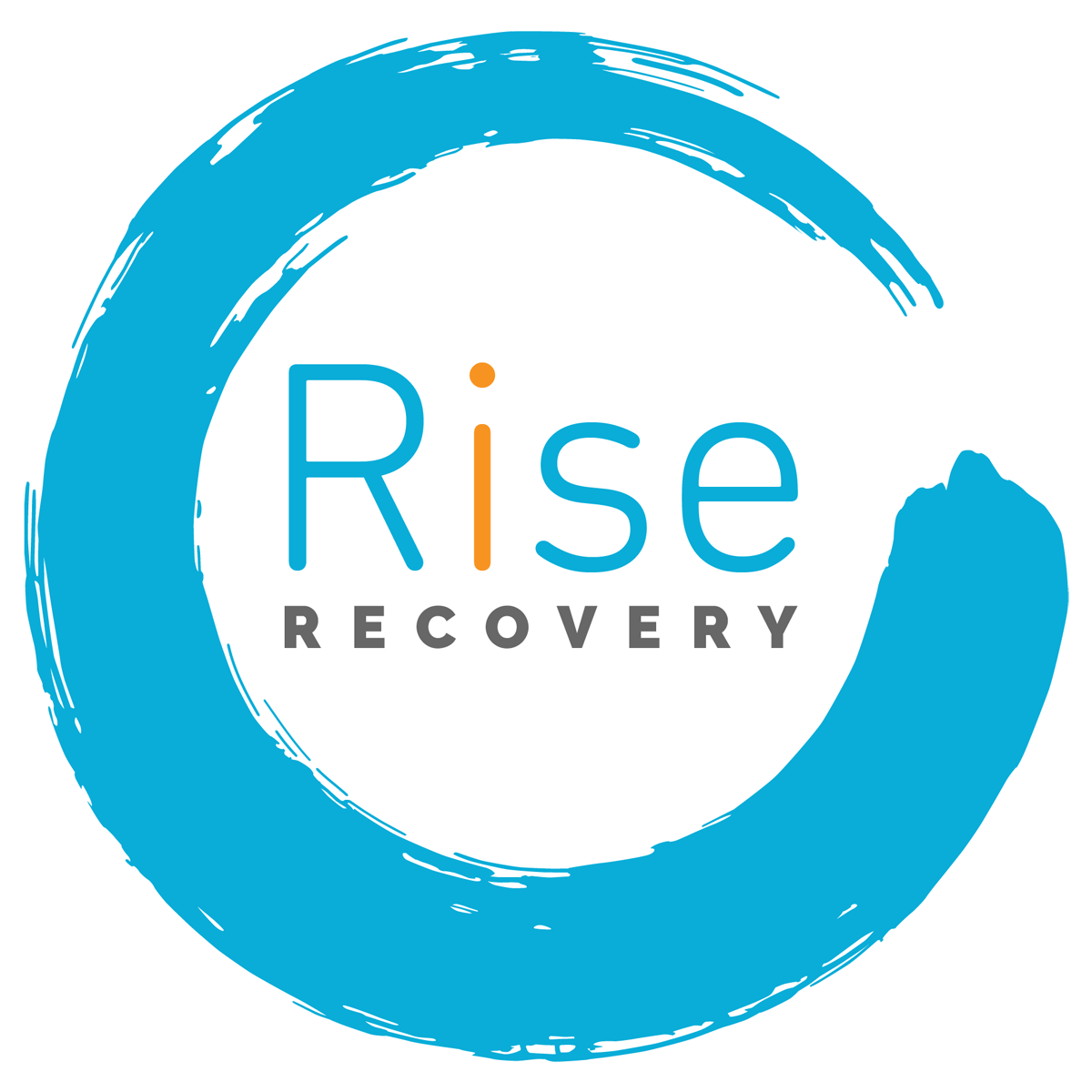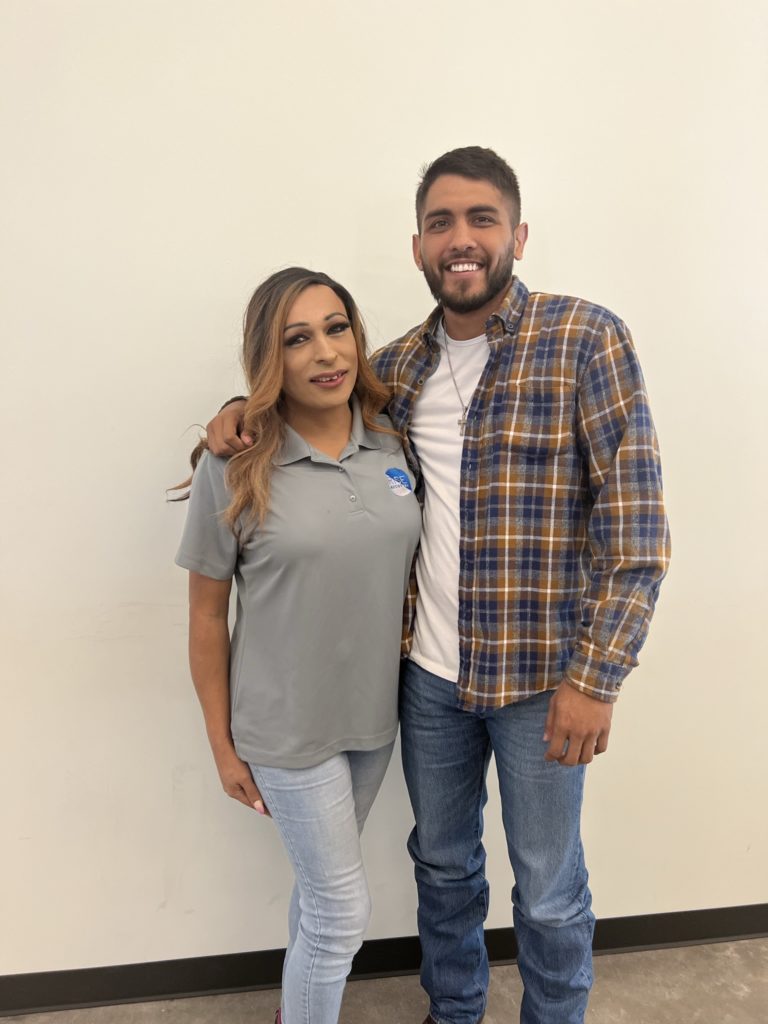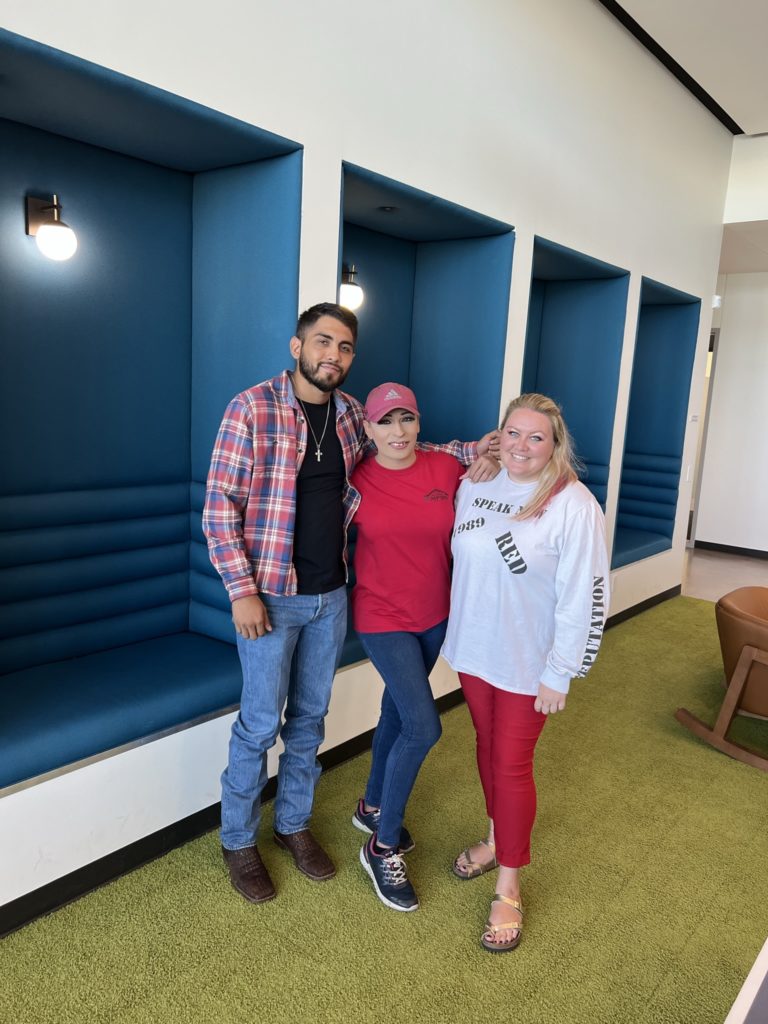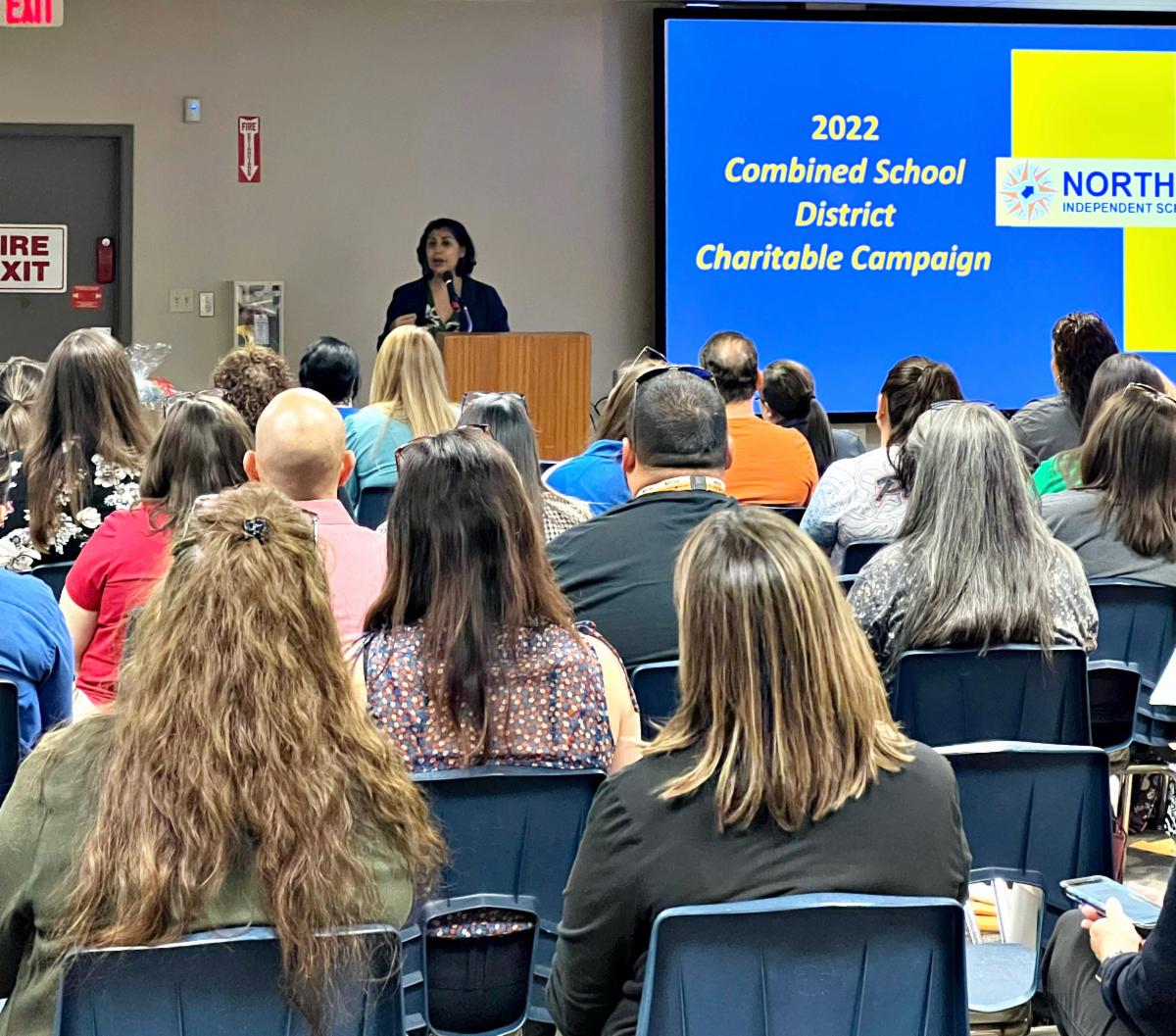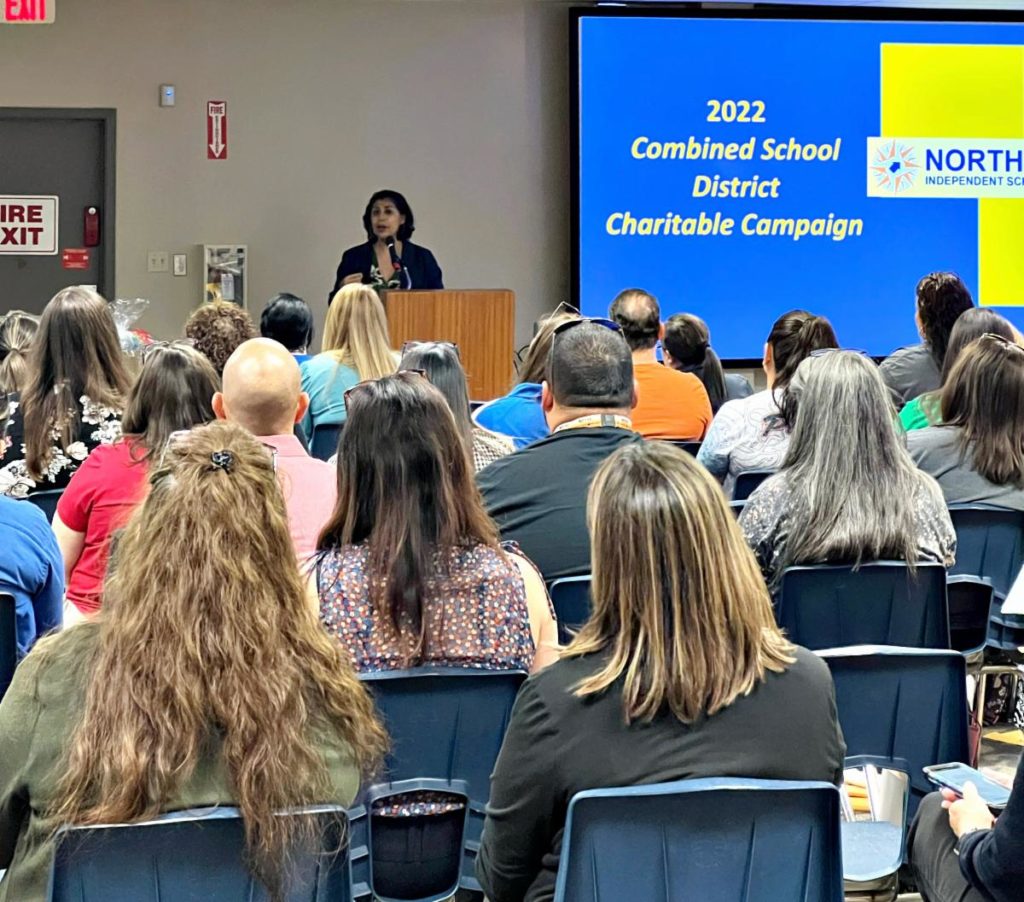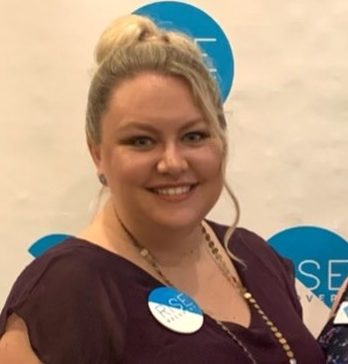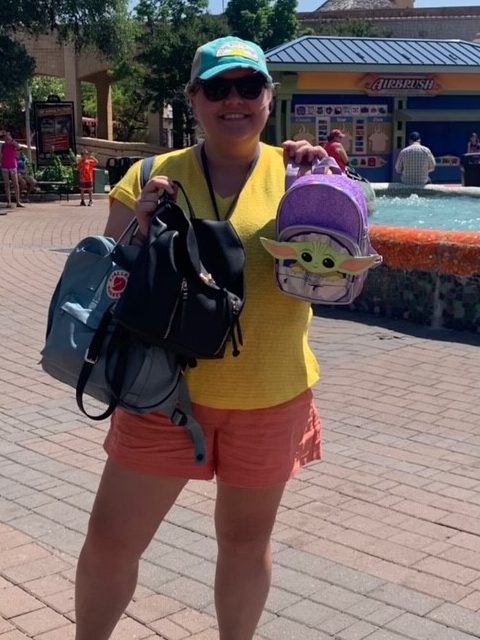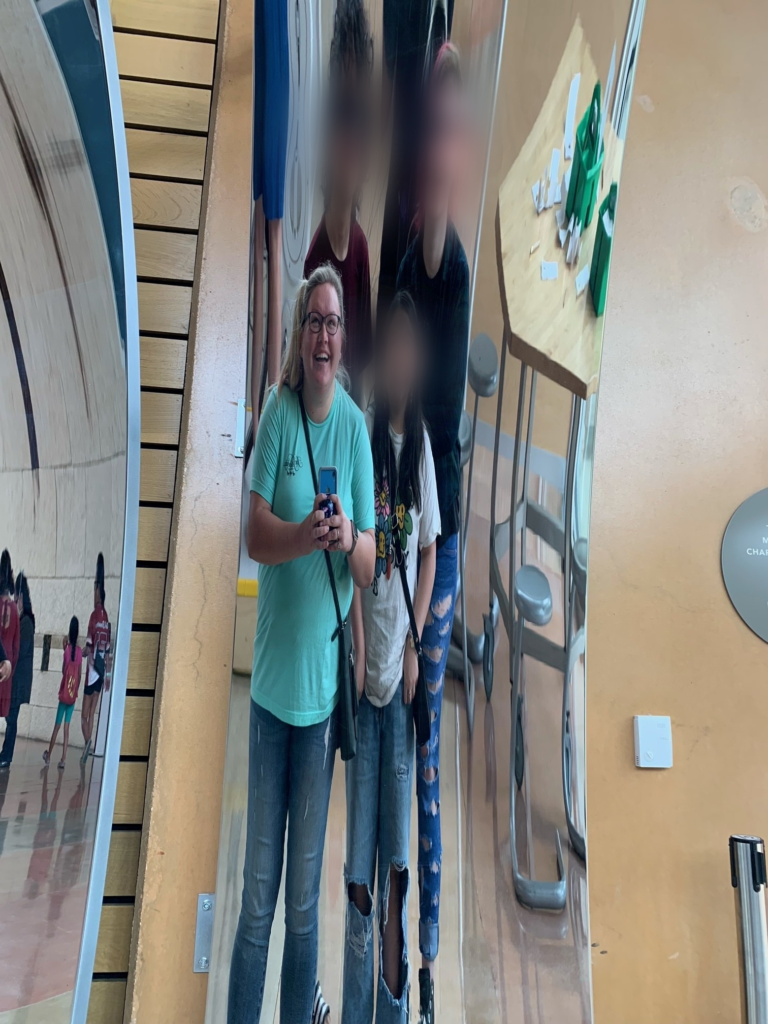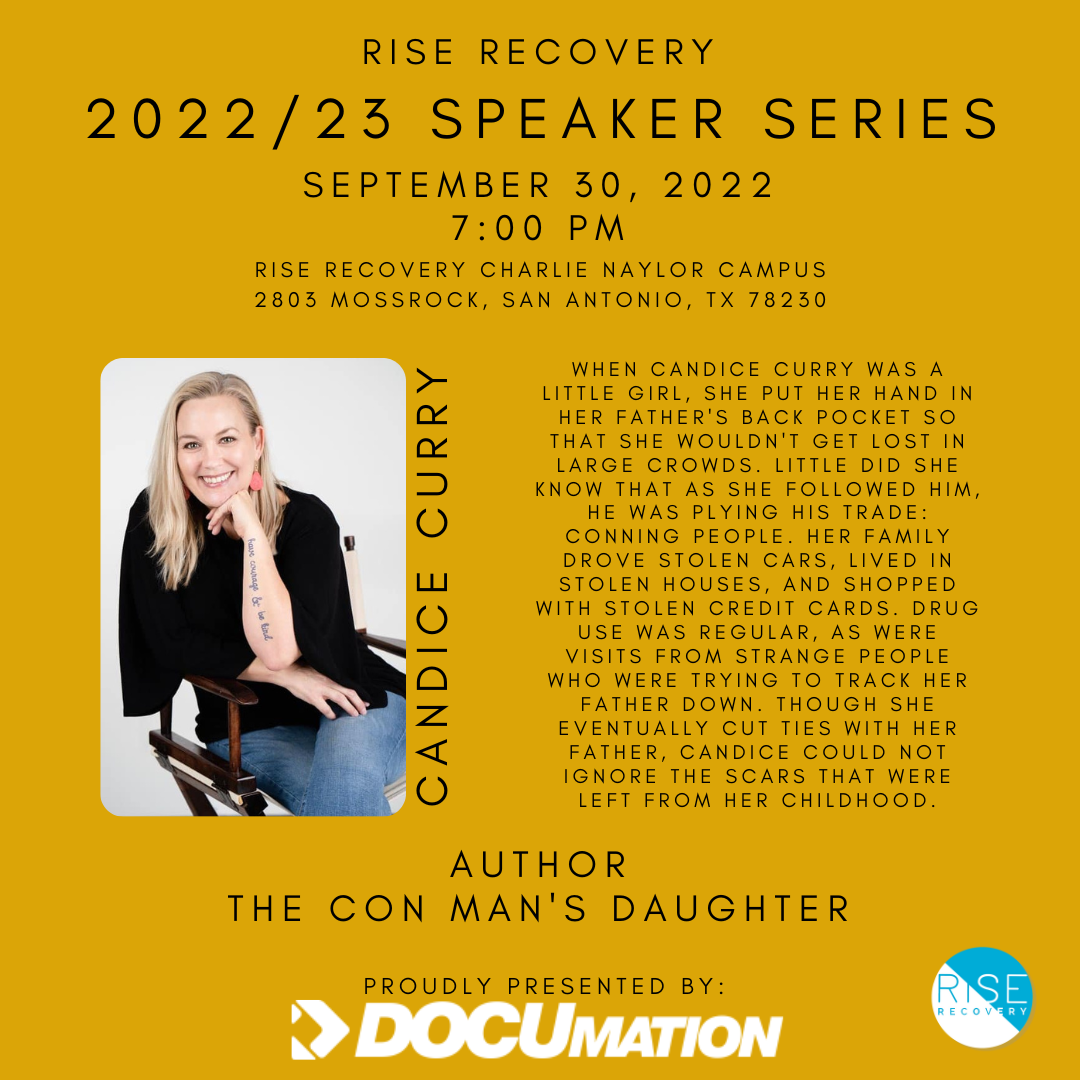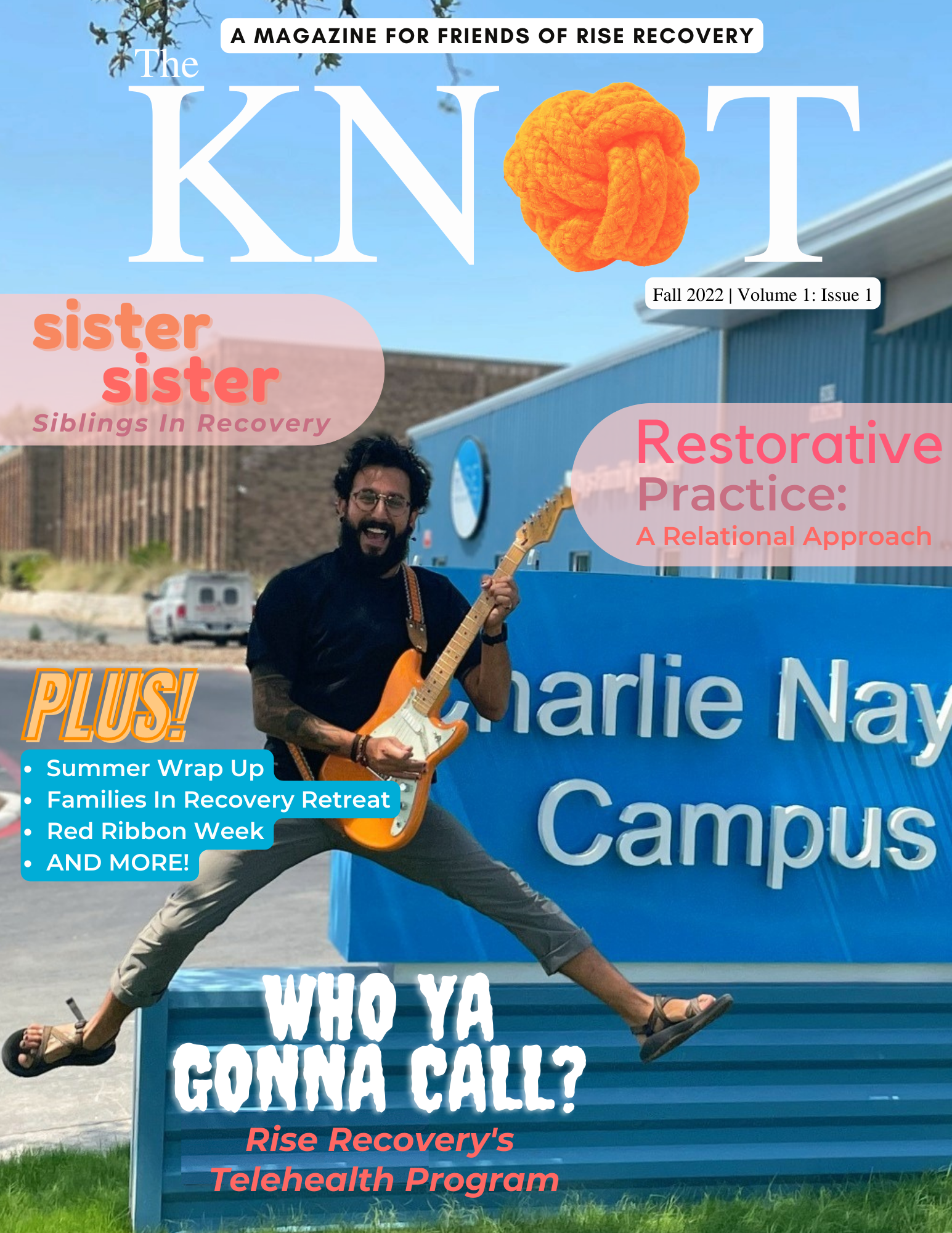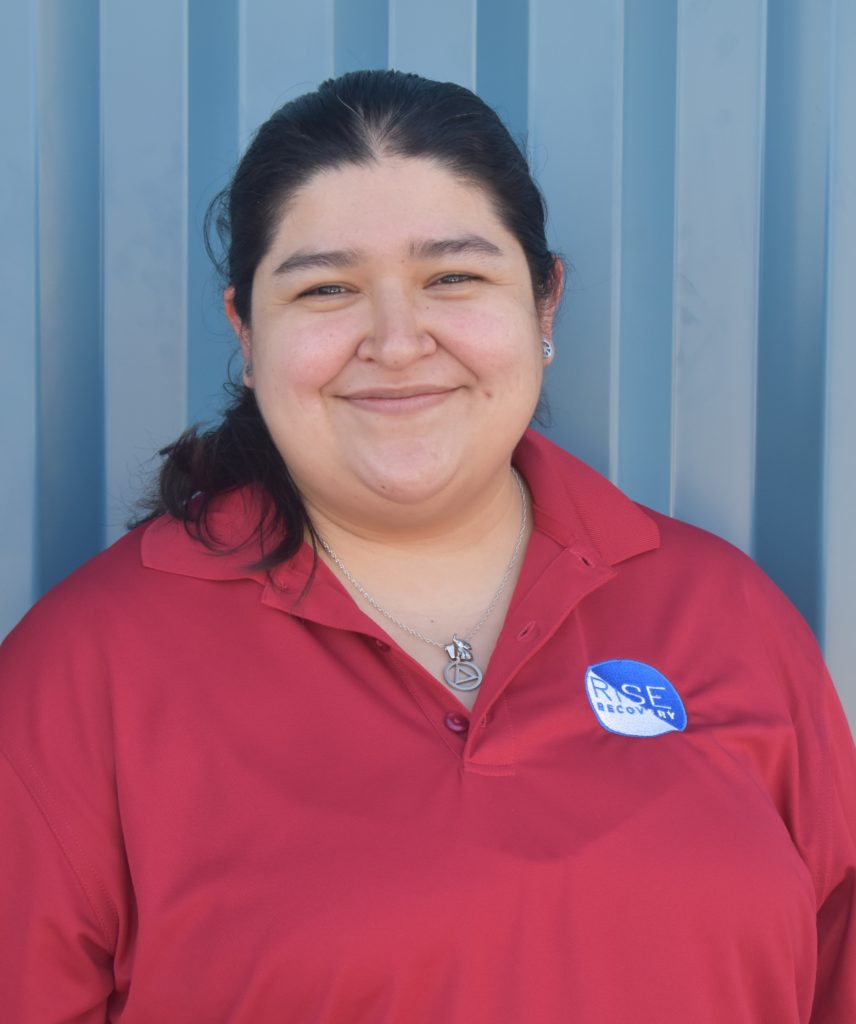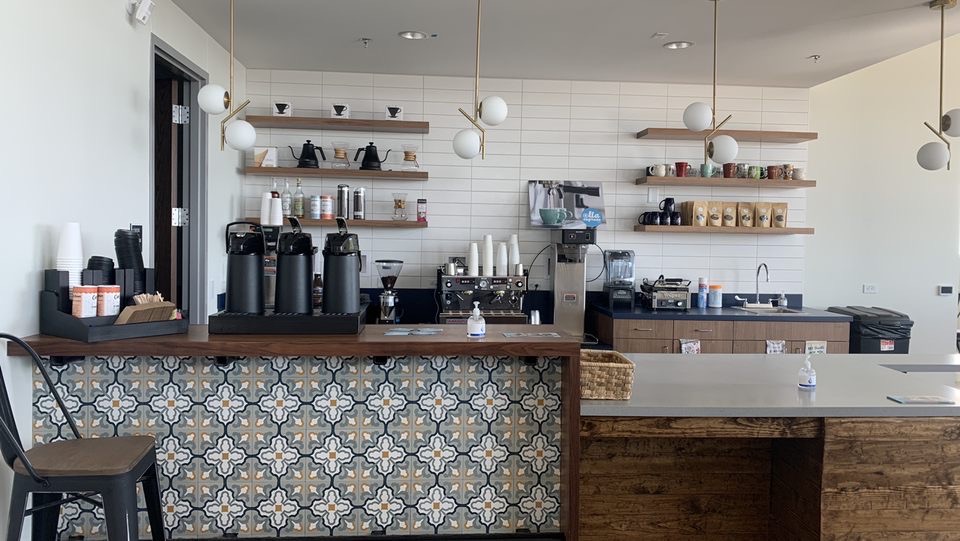Recovery Uncovered: Season 2 Episode 4 | Fentanyl & Naloxone
Each month, Recovery Uncovered brings great information as well as moving stories to the forefront of the conversation around recovery. October’s episode features Evita Morin, Rise Recovery’s CEO, with timely information about the country’s current fentanyl crisis.
Staff Spotlight: Ricky Hill, Armani Jè Balderas and the Dynamics of Telehealth
Rise Recovery’s Ricky Hill, Youth and Telehealth Program Manager, and Armani Jè Balderas, Telehealth Youth Peer Recovery Coach, sat down to talk about the importance of telehealth peer recovery, giving back to the recovery community, and what legacy of telehealth can have at Rise Recovery!
So, tell me about yourself and what you do at Rise Recovery
Armani: I have been with Rise Recovery for about 8 months now, and I am the telehealth peer recovery coach. I work with the youth and provide services for our youth through telehealth program. I am also one of the Spanish language family counselors.
Ricky: I’ve been here about 10 months I’m the YRCC, Youth & Telehealth Manager so I oversee all telehealth operations, everything with our YRCC (Youth Recovery Community Center) and APG (Alternative Peer Group.) I’m also a Spanish language youth and family counselor.
So, let’s talk a little bit about Telehealth; what do y’all think makes Telehealth so unique to RR?
R: I think the unique part about telehealth is that we do everything that our in-person services provide. Everything from one-on-one counseling, group sessions, social activities, and even the family support groups, but we’re able to reach communities that normally wouldn’t have access to these resources. I Which definitely would’ve been something vital for me as a teenager because I came from that type of environment. So, it’s cool that we get to reach to those kids that need the help. They just don’t know where to get it.
A: The thing that makes telehealth unique for me, and what I’ve seen, is the fact that we provide that barrier-free service. We have that ability to reach people who may not have vehicles, people who may not have the opportunity or the resources to actually go out to the resources that are out there right now. We bring those resources to them. That’s the important thing; that we’re here to bring everything that they need so that there’s a “no-excuse” kind of thing. In addition, through telehealth we can reach a whole lot more people. As of September 1st, we just got funding to go statewide so we’re not restricted to only certain counties anymore. Our wings are expanding, and we’re able to reach more and more people.
From my understanding y’all our working on giving your youth participants in Telehealth resources that they can take back to their community?
R: So recently we’ve been doing a lot of educational presentations on subjects like fentanyl, which has been really impacting a lot of communities. So even if a kid is not struggling with substance use, the fact that we get to present to so many students that once, they have the education in prevention. They have that awareness of what may not be going on currently in their community, but the possibility of what could happen. So, they have that as a cautionary tale to go by.
A: To piggyback off what Ricky was saying, you know, providing that education for me, I know would have helped me a lot when I was in school. And basically, we’re kind of putting a dent in that school to prison pipeline because, when they get in trouble, it’s just a constant cycle. It’s like they get in trouble, they go, they go to an AEP (Alternative Education Program), you know, and then AEP all over again. And then by the time they, go to juvenile probation or they go to regular probation, because they’re not being given the education on – about fentanyl, on the different drugs, on how the drugs can affect your family, things like that. So, we provide that that that education to try to put a dent and to try to prevent, more cases.
Can you talk a little bit about the importance of giving back as a community especially as individuals in recovery?
A: I’ve always been a very giving person. I’ve always been someone who, warms my heart on my sleeve., If you can see it, it’s there. But especially when it comes to the work that we do and recovery, there’s a saying in recovery: we can only keep what we have by giving it away. The more we give away, the more we get. So, you know the saying the only way to receive blessings is to give blessings, that is how I that is how I see this program. With every child that I talked to, with every participant that I talked with, every family member that I talked to, I’m giving them a little bit of hope that there is something better. I’m giving them that option to choose something other than the path that they were going down. And the entire organization, whether they are in recovery or, they have somebody going through recovery or they’re going through some sort of 12 step program has that love and dedication for these participants. And That’s something that is just so amazing and something that me personally, in my almost 40 years of existence, I have never seen in any other organization. So, I think that’s what sets us apart. And the beauty of this organization is that it gives resources that are absolutely 100% necessary everywhere. And that we provide those services with love, compassion and caring. So that’s how I see the things that we do.
R: The biggest way I give back is giving these kids something that I never had. My journey with substance use started at 15, and it was on and off throughout high school. But regardless, I’m pretty sure my life would have turned out a lot differently had I had resources like Telehealth because where I come from, there is no such thing as recovery. There is no such thing as freedom from substance use. So, to be able to, to give these kids something that otherwise they wouldn’t be aware of. Giving them a voice because like it’s been said in a lot of and especially in the education system, children are better seen rather than heard. That’s definitely the barrier that we try to break on a daily basis.
Going back to telehealth, What’s the best thing about being a part of telehealth?
A: Something that that Ricky had brought up, brought to our attention a long time ago was to actually ask these participants, what excites you, what makes you happy, what’s going to make you want to come back, you know? We got a lot of great feedback and, as coaches, we needed to come up with something that was going to fulfill what they wanted. So, we started with our social activities, we started doing interactive activities. One of the activities that we did was to make God boxes, we bought all the material for them, we sent it out to them and we explained the concept of a God box and explained what it was and how it can help and things like that. And, you know, they decorated it, they put glitter, they painted it got very, very creative with it. And, the impact that we saw that we were having, allowing them to listen to music, have fun, and, just know that for those two hours that we were doing our social activity, they did not worry about any kind of substance use and that’s the main important thing is that when we come to these kids, we do not identify them the same way we identify ourselves. You know, we don’t tell them, oh, you have a problem or you have this. We allow them to come to us and allow them to tell us, “Hey, I have a problem. This is the help that I need.”
When it comes to telehealth, what legacy do you want to leave?
R: I’ve met with different people and asked them for their opinions on telehealth services. And it’s usually like, no, that’s never going to work. But my biggest goal and my vision for telehealth are for this to be at some point like the national model for telehealth substance use services because it’s something that’s a bit unorthodox, but now it’s become a little bit more normalized, especially with COVID. But my biggest goal is for it to be a nationally recognized form of recovery.
A: Being the first people to launch this, you know, this telehealth program, it’s like we are setting the foundation. To build that foundation we work hard, do what we need to do and get our name out there to be nationally recognized. I want [Rise Recovery] to be THAT organization., As soon as somebody comes in and says, “Hey, I’m suffering from this,” or “I’m dealing with this.” BOOM: here you go. Here’s a pamphlet for recovery telehealth. I would like to see it go global,
I think it’s also important to note it’s not all cupcakes and rainbows. We have difficult times that we have to face. We have ideas that clash or, ideas that that aren’t, seen thorough- We have time. We have our bodies. But the one thing about this program and about talent especially is that, going back to when I was talking to a lot about the love, compassion and caring, it’s like we carry that for ourselves as much as we carry it for our participants and for everybody And, it’s something that I’ve never experienced. And, coming into this is our organization. It was just something that I was like, the first time somebody put their arms around me told me, “I love you,” I was like, “What the heck?”
What’s your favorite thing about Rise so far?
R: Of the number of things that make this place so amazing, it’s the opportunity that it gives me to interact with the youth and even the families as well. Because I lived through that journey which I had to go through in order to get to where I’m at now, I get to connect with you. And the best part about it is like I’m coming at them from a different angle than people came at me. I come at them and say, “I don’t work for your school. I don’t work for you for the justice system. I don’t work for your parents. I’m here to support you. Somebody will help to support your family.” And the best part is that approaching it as a team unit with every family, that’s still the main goal. [Our approach is to] really just to make them feel at home; that sense of belonging that I know they’ve probably lacked for a long time. Aside from the staff and everybody else, that’s my favorite part about working here is just how I’m able to approach the use now.
A: My favorite part of working at Rise came from one of my participants. He had his difficulties. He had his things that that were there were, life on life’s terms, right. He had his things going on for him. But he came back, and he successfully completed the program. He was one of the first to complete this program, and being able to still have that connection with him, being able to text him and to see how wonderful he’s doing because of this program and to know that a little piece of his success came from the hard work that we all put into it. And, it just makes me believe and it makes me want to do it more. You get that little taste of ice cream, and then you want the whole gallon, you know what I mean? So that that’s what it is for me. It’s the fact that knowing that I am making a difference in someone’s life, I am just a little piece of the puzzle in the big picture. It also helps that we have amazing leadership.
R: The transformation I have gone through my fair share of I wouldn’t say negative experiences, but like trials and tribulations. To finally have my first participants finish the program I hadn’t seen them in like two months. And he comes back, and he finishes [the program] and we do our last one-on-one over Zoom and he’s a completely different person. He’s saying, “Yeah, I’m doing these things to take care of my mental health. I’m doing all the things that you taught me, like the coping mechanisms and all that.” So, to see that what we’re trying to teach them is actually being applied in their life. And because of that, that transformation is being made. Those success stories make everything so worth it. Absolutely.
What is some advice that you would give any participant coming to rise or just anyone who’s on their journey of sobriety?
A: I guess the best piece of advice would be a two-part thing for me. Um, the first thing would be something that we get told. A lot of times in the room, some of our recovery is “Give yourself a break.” That’s something that I’ve always told my participants, I’ve shared about this a lot is the fact that you do not let your past mistakes dictate your future actions. And, then I explain to them with that, just because you made this mistake, just because you did this and you got caught, it does not make you a bad person. You are a good person who made a bad decision. And because you’re coming here, and you’ve taken that first step to walk through those doors or to turn on that laptop to get on to our telehealth program. You made the decision to not allow your past mistakes, to dictate your future actions.
R: For me, the biggest piece of advice, and this is actually the biggest piece of advice that I got (and its so cliché) was trust in the process because. I’ll say this has been one of the most difficult processes that I’ve been through. But because I’ve trusted in it, and I’ve done the work that I’ve had to do, my life has gotten way better than I could have ever imagined. And I think that’s something that kind of sort of keeps us out of recovery. At least something that kept me out was, I didn’t know what the process looked like, nor did I really care to know. But I was rolling with the punches. Going through adversity. Dealing with the trials and tribulations that come with being in recovery, because it’s temporary and the hope that comes out on the other side of that, it makes everything so much more worth it. So, it’s a lot of just trusting in this and, getting comfortable with being very uncomfortable.
What advice would you give a participant who’s just starting out in the telehealth program?
A: One piece of advice and I think that that both Ricky and I can agree on this, is that the best piece of advice is that when we let them know that we don’t work for their probation officer. We don’t work for their school district. We don’t work for their parents. We are only strictly there for them. It breaks down a wall or breaks down a barrier that, that they’ve already had built up on them. And, the best thing to do is to let them know I’m here for you. Without you, I don’t exist. And so, what that puts the ball in there that gives them the opportunity to say, “Hey, this person is really caring about me.” And especially when you keep that, that, that one on one with them, and you keep touching base with them, like send them a text message randomly, you know, once a week or something, just checking up on you. How you doing? It makes them feel like you are really, really here for them.
R: It’s kind of hard to come up with an answer to this because, I feel like my first interactions with participants have been very different because it’s very different dynamics that we deal with. And it all goes back to trust for me, because if there’s no trust, there’s nothing. There’s nothing going back to the, you know, I don’t work for your PO or for your school district or for your parents. We’re going to get through this. We’re going to get through this. But if you will, just confide in me; trust me just a little bit. And help me to help you. Being open with us and also like reassuring them that, I’m working at your pace. I’m not here to push my beliefs on you. I’m not here to tell you what I think you need to do. I want you to tell me what you think is going to work for you. What do you think is going to help you get some progress towards this ultimate goal that we have? Like really empowering them to make that decision. I think that’s when everything changes.
Boundaries: A Necessary Kindness in Times of Chaos
Sometimes when you have a member of the family dealing with a substance use issue, you have to set boundaries to ensure you and your home are safe. This also helps ensure that you are not in any way enabling your loved one with the issue. It may feel difficult and upsetting to enact a boundary, but it is ultimately a kindness.
Family Peer Recovery Coach, Dr. Eric Daxon, RSPS has created a helpful fact sheet around boundaries. Check it out below to learn about the types of boundaries, when and why a boundary may be needed, and how to enforce your boundary. Most of all, remember that setting a boundary isn’t turning your back on your loved one with substance use issues. It’s a kindness for both of you.
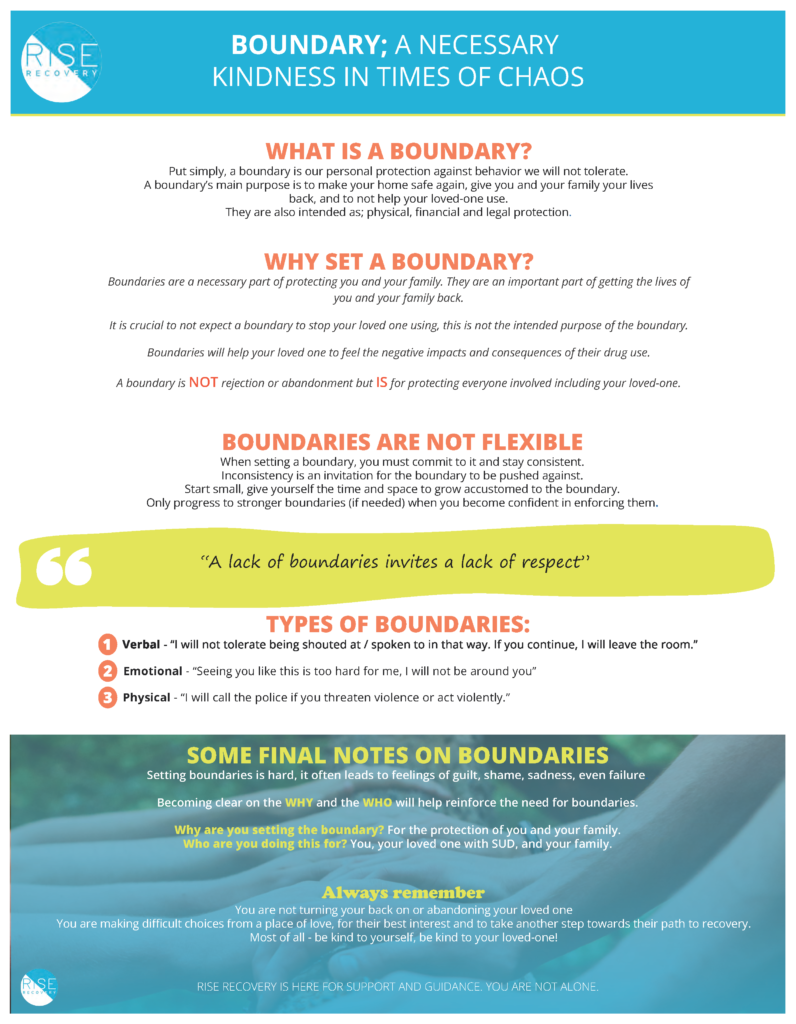
Rise Recovery Staff Spotlight: Sarah Waltz
Here at Rise, we have a place for everyone and it includes our New Generations program, or as we call them, New Gens. But what is it about New Gens that makes them so unique and such a necessary component of the work we do? We stopped by to chat with Sarah Waltz, our New Gens Coordinator, to speak on the importance of the New Gens youth program, and why breaking the cycle can be a breakthrough for their future.
So, tell me about yourself and what you do at Rise Recovery.
My name is Sarah, I’m an LCSW or Licensed Clinical Social Worker and I work with the New Gens at Rise Recovery. New Gens are a group of kids 9-17 that have a loved one that use substances. So, my group is kids that don’t use, but have a loved one that do.
How does New Gens relate to you, and what is the importance of New Gens?
Both of my parents are addicts. I grew up in a household before I met my dad with my mom who was cooking meth in our apartment and selling drugs. It was not a good situation. And it was challenging going to school every day and not being able to talk about the things going on at home because it was so taboo. I didn’t have a safe space to talk about things, and that’s what New Gen is for. For kids to have a safe space to talk about things at home, and not feel judged and feel heard. We have kids that can be like “oh, been there!”
What do you believe is the importance of the New Gen when it comes to Rise Recovery?
So, we talk a lot about addiction being a family disease at Rise. Often times the New Gens are, if you look at dynamics, the lost kids; the lost children in the family. Because New Gens are generally going to be the kids that see their sibling or their parents struggling and they’re going to be the perfect little angel; “I will cause no waves, I will make sure that I do nothing bad so that all the attention can go on the person that’s using. I am going to make sure that there’s some homeostasis in my home.”
And when that happens, we as new gens, we’re pushing our feelings down, we’re masking our feelings a lot, it’s one of those things where I’m going to make sure everyone else is okay before I make sure that I am okay. And for our group, we try to encourage advocating for ourselves, although it’s challenging and we have a funny little saying of #newgens (hashtag new gens.) That’s how we call each other out. We try to make sure it’s a place where they can share their feelings and feel open and vulnerable to put themselves first.
So, you’re not just Rise Recovery’s New Gen Coordinator you’re also a licensed social worker. Can you talk a little bit about that, and how you apply what you learned to your work here?
Of course. I really like the fact that I’m not only able to work with the New Gens, but also I am able to go into the schools. I go into Harlandale and Alamo Heights high schools as well, to conduct groups similar to how the APG (alternative peer group) does for youth. I think that’s really cool that I can float and provide services for different groups. Something that I would like to do that I haven’t been able to do that will utilize my social work background is family counseling; so, getting all parties together. I think that would just be so cool and something that I learned I’m really good at is getting all parties together and on the same page. I’m able to work on the Youth Systems of Care Task Force with the Kronkosky Foundation along with other leaders in the community. And basically, in that task force we’re trying to put together strategies on how to make it more of like a one-stop shop for youth who need service. Making it to where if youth A is coming to Rise Recovery, but then they also need to go to CHCS (Center for Healthcare Services) for example, then they don’t need to retell their whole story to CHCS. How can we make it where it’s more fluid and easier and less traumatic for youth seeking multiple services?
I know we touched on what we want for you in the future. What type of legacy do you want to leave here at Rise when it comes to the New Gens program?
What I would want to happen with New Gens is to see that program really grow and flourish which we have done. I started back in November of 2021, and we had two maybe three kids coming regularly, and now we’re back up to a total of 15 with 10-12 regularly coming. And I think what I would like to see for New Gens is a big group like the youth has where there are 40 regular kids, and we can have a steering committee; the youth call it a PAC peer advisory council, but that’s what I would like to see for New Gens where they are really taking the lead and ownership while the staff is just there to govern and guide as needed. I would really like to see our older youth taking some leadership roles and being able to help plan and maybe run group meetings like how youth bring topics for their meetings. I think a really good goal would be at Families in Recovery next year for us to have as many New Gens present as the youth APG… I want them to be there and represent; like “we’re here too, guys!”
What type of advice would you give someone who’s starting out in New Gens?
I would tell them you don’t have to follow the same path as their loved ones. Breaking stigma and breaking cycles are challenging, but it’s doable. I have firsthand experience. Nobody in my whole entire family went to college before me and both sides of my parents’ families-grandparents- are alcoholics or addicts. Everybody in my family has dealt with substance use, and here I am, not an addict. How I did that was by seeing what happened and how their lives turned out and knowing that I didn’t want my life to be that way. So, just really encouraging them that you know you can make different decisions. You can make changes, and you can be the person that breaks the cycle in your family.
What is your favorite thing about working with New Gens?
They’re all just so funny, and the best thing is they love being in New Gens. Last week I was talking to a parent after group and their kids had only been here one time before and that evening, they had tickets for a Missions baseball game and the kids said, “I don’t want to go to the baseball game. I want to go to Rise Recovery. I want to go to group.” The reason they gave was that they felt safe to share, and number two, it’s so fun. So that’s the most amazing thing, and I love that they want to be here, that they want to come hangs out, that this is a safe space because so many kids don’t have that, and to be able to have that, not only with trusted adults, but with peers experiencing similar situations? *Chef’s kiss!*
What is your favorite part of working at Rise Recovery?
I just love being here. So many people on staff are not just coworkers; they’re friends and some even I consider family. I just think that every day I want to come to work, because if it’s not the kids I’m interacting with, then it’s my coworkers that I love. When I’m here I’m always laughing, and having a good time; it doesn’t even really feel like work. It’s amazing.
Recovery Uncovered: Season 2 Episode 3 | Telehealth
Each month, Recovery Uncovered brings great information as well as moving stories to the forefront of the conversation around recovery. September’s episode features Adam Cavazos of Rise Recovery’s telehealth team discussing virtual recovery options.
Candice Curry, Author of The Con Man’s Daughter, at Rise Recovery
On September 30, 2022 Rise Recovery launched our first-ever speaker series with author, Candice Curry. In her book, Ms. Curry speaks candidly about her childhood experience living with a parent with substance use issues. Relatable and charming, Ms. Curry was a compelling speaker with so much heart.
See our next speaker, Dr. Heather Holder, on Friday, October 28 at 7 PM for a conversation about Dual Diagnosis: a situation in which a patient has both a mental health disorder as well as a substance use issue.
The Knot: A Magazine for Friends of Rise Recovery
Rise Recovery is grateful for our Friends of Rise Recovery: a group of donors making monthly donations that sustain our mission. Finally, we are able to offer a special perk when you become a monthly donor: our new quarterly magazine, The Knot.
Read our first ever issue here: Volume 1 Issue 1
Monthly donors will recevie a physical copy of the magazine in their mailboxes soon. If you would like to become a Friend of Rise Recovery with a monthly donation, please follow this link below to sign up!
Become a Friend of Rise Recovery Today!
Rise Recovery Staff Spotlight: Jessica Alcala
The Harlandale Care Center sounds like a pretty ordinary name for a school building, but this is actually a place of healing, hope, and recovery beyond the scope of any regular school day. The people who make their offices inside these unassuming walls are actually part of a grand experiment to better serve the students of Harlandale ISD. The San Antonio Mobile Mental Wellness Collaborative was founded in 2019 by a group of nonprofits wanting to provide a holistic approach to mental wellness by breaking barriers and bringing services into the schools.
Jessica Alcala, a Licensed Chemical Dependency Counselor, represents Rise Recovery as a Mobile Mental Wellness Collaborative member. Rather than make her office on the Rise Recovery
Charlie Naylor Campus, Jessica drives to the Harlandale Alternative School every day and drinks her first cup of coffee in her office at the Harlandale Care Center. We caught up with Jessica this week to learn more about her work.
What’s your favorite thing about working with youth?
There are a lot of things: One, they’re fun. I love working with them. They’re honest, they share what they feel. I feel like the big need for a lot of teenagers is that they need someone to talk to. Growing up as a teenager, I didn’t know who to talk to, but because of the community and how Rise is, I think it gets the students to really open up without being judged. They’re so creative too.
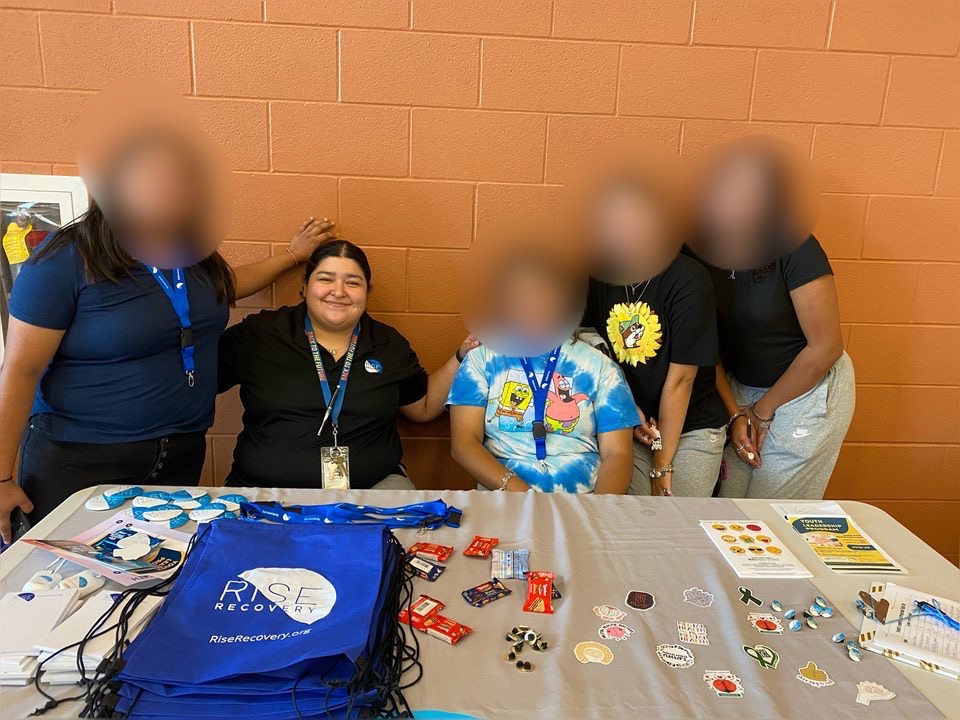
What advice would you give a youth member starting their sobriety?
One of the biggest I would suggest is that you know there are going to be challenges throughout your early sobriety and life and general. Don’t quit before a miracle happens. Keep going and ask for help. It’s okay to ask for help. Don’t be afraid to share whatever it is you’re going through. Being vulnerable doesn’t make you weak, it makes you stronger. That’s what I would’ve wanted for someone to tell me.
Can you explain the Youth Leadership Program?
The YLP program is a pilot program that started last year. We started it at the STEM Academy in Harlandale ISD. It’s a leadership program to teach the students to be advocates for mental health and substance abuse. There are two phases: the first phase is them learning about what the program is. Then there’s education on mental health, leadership styles, communication and how they can communicate assertively, and teaching how to inspire others. After they finish that in the very last session before they graduate on their first phase, we ask them: “what is something that you feel passionate about that you would want to present?”
This past year, the students taught the faculty about coping skills, and a lot of the information that was provided to them through one of our partners in the collaborative: the Children’s Bereavement Center. Now our goal for this year is to have our peer leaders from the program last year teach our new recruits this year so that it keeps growing. That is our hope for the program.
What is something that I hope the students will get out of it?
I hope we can break the stigma of mental health and substance abuse. I hope the students are able to see their mental health as not a disability, but a strength. Same for substance abuse, I believe they go hand in hand.
Can you explain what you do hear at the Harlandale Care Center?
With the Care Center, not only do I do the youth leadership program, but I also provide group sessions to the alternative school. The students that are caught using substances are automatically referred to us. We meet them on campus and provide them with individual sessions as well as group sessions. Once they complete their time at the alternative they have the choice to continue with us or end services. So, if they decide to continue services, we will follow them. We go into Leal Middle School, Kingsborough Middle, Harlandale Middle, STEM Academy, Frank Tejeda campus, Harlandale High School, and McCollum High School. We’ve also received elementary referrals.
That’s one of the great things about Rise Recovery is that we don’t just help out the people struggling with substances, but the whole family. So we will get referrals from family members that need support because their loved ones are using substances. We get referrals from Rise Recovery’s Young Adult Program and New Gens. We’re pretty much all around in Harlandale.
What is your favorite thing about working at Rise Recovery?
The people. The people that I work with. I know Roy probably hears it all the time, but he’s the best boss I’ve ever had. Not only him, but everyone at work is so kind, loving, and nonjudgmental. It doesn’t even feel like work to me. It’s something that I’m grateful to wake up and be like “Omg yes! I’m going to work!” It’s like a second family, and that is what I love.



